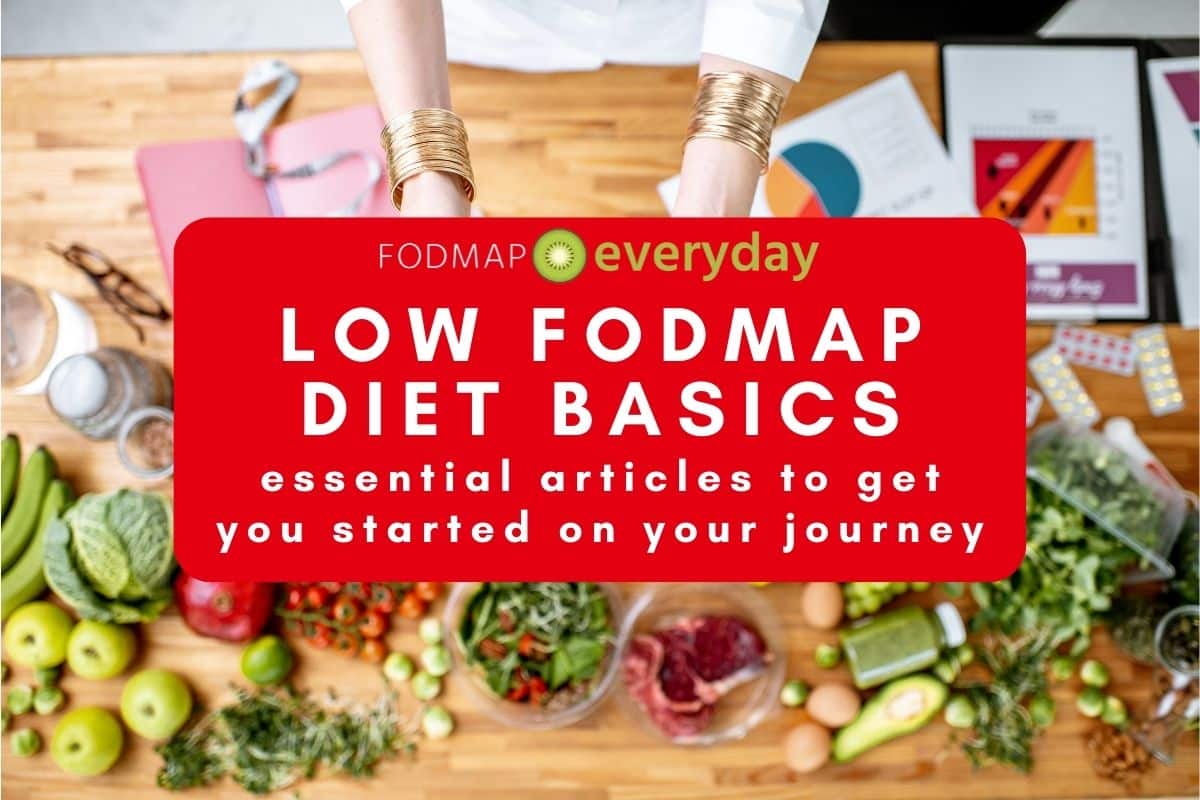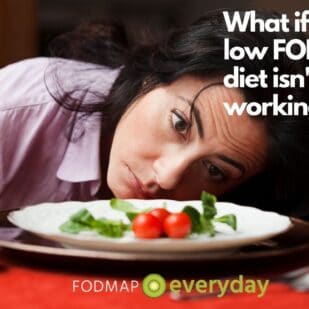This article explains the The Role Of The Dietitian vs. The Gastroenterologist. They do not perform the same functions, yet both are key members of your medical team.
Are you suffering from stomach and intestinal issues? Have you been told by your primary care physician that you need to be seen by a gastroenterologist (GI)?
Have you subsequently been diagnosed with Irritable Bowel Syndrome (IBS) and told you need to follow a low FODMAP diet and you need to work with a Registered Dietitian?
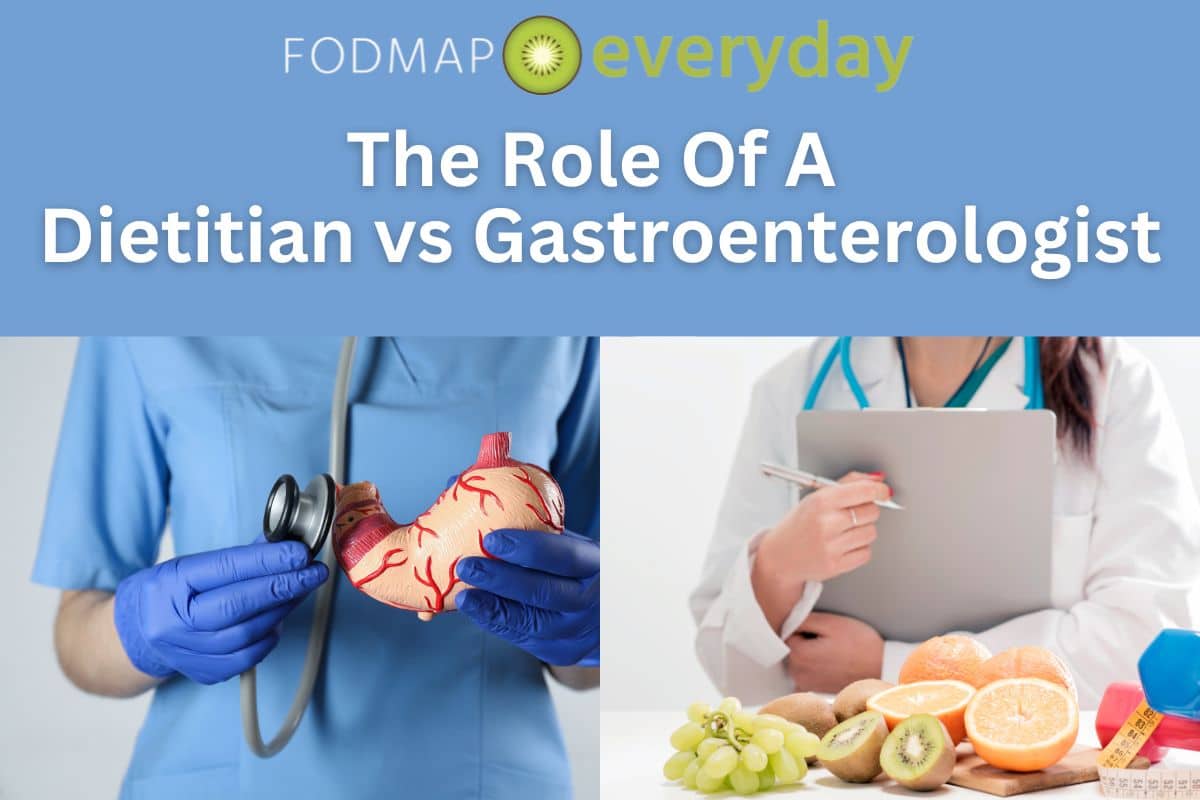
- Do You Need The Support & Guidance Of A Dietitian If You Have A Gastroenterologist?
- Get a Diagnosis From A Gastroenterologist
- The Role Of The Gastroenterologist
- What Is A Registered Dietitian?
- The Role Of The Dietitian
- What Conditions Do Dietitians Help With?
- How To Choose A Dietitian
- What If I Can’t Afford A Dietitian?
- The Takeaway
Do You Need The Support & Guidance Of A Dietitian If You Have A Gastroenterologist?
We say YES! Statistically and anecdotally you have a far greater chance of success if you work with a RD.
What is the role of the registered dietitian (RD) if you have been diagnosed with IBS? Do you really need one, and if so, why? You’ve seen the gastroenterologist (GI) and they gave you a handout about the low FODMAP diet.
Aren’t you all set to start the diet…? We would say – no.
But first let’s start at the beginning.
Get a Diagnosis From A Gastroenterologist
A gastroenterologist (GI) is a physician (medical doctor – MD) who specializes in diseases of the gastrointestinal tract and liver. They can diagnose and treat; in this article we will be addressing the limits of their specific role of treatment in relation to the low FODMAP diet for IBS.
Do Not Self Diagnose IBS Or Any Digestive System Issues
It is very important not to self-diagnose yourself with irritable bowel syndrome (IBS), primarily because there are many other medical issues that have similar symptoms. These can range from celiac disease (also called coeliac disease) to endometriosis, ulcerative colitis, diverticulitis, IBD, to other serious, even life-threatening conditions. You might have mild or severe symptoms, but we cannot stress strongly enough that you should have an IBS diagnosis from a gastroenterologist, and a recommendation from that doctor to try the diet, before embarking upon it.
Please do not undertake the low FODMAP diet without a medical recommendation, preferably from a gastroenterologist after they have conducted tests to rule out other medical issues.
Please do not undertake the low FODMAP diet without a medical recommendation, preferably from a gastroenterologist after they have conducted tests to rule out other medical issues.
How Is IBS Diagnosed?
You can read our in-depth article about getting a diagnosis here: IBS: Step-by-Step Guide From Diagnosis To Symptom Free Living.
A GI will consider your entire medical history, not just your GI symptoms, and can order all the tests that you need, such as screening you for celiac, and assess the results. The diagnosis of IBS is one of exclusion; there is no one direct test for IBS. Specialists such as GIs have seen many kinds of symptom presentations (which might be similar to IBS) and are best equipped to pronounce a diagnosis.
A gastroenterologist is the best medical professional equipped to provide you with an IBS diagnosis, by performing a thorough exam.

A gastroenterologist is the best medical professional equipped to provide you with an IBS diagnosis.
The Role Of The Gastroenterologist
Here, in brief, is what a gastroenterologist does:
- Gastroenterologists are accredited medical doctors who have undergone extensive education and training.
- They are regulated/licensed and bound by strict laws, ethically and legally
- Prescribes labs/tests, medication and evaluates results.
- Is able to make a specific diagnosis.
- May offer some very basic nutritional guidelines (e.g., eat more fiber, try low FODMAP).
- Generally, spends limited time with patients (20 minutes or so – some more detailed, some less)
Gastroenterologists & IBS Treatment Plans
Let’s say you have received an IBS diagnosis from a GI, and as part of your treatment plan they have told you that the low FODMAP diet could very well help, and that you should try it.
Maybe they have given you a hand-out – a piece of paper with a column of “high FODMAP foods” and “low FODMAP foods”.. Maybe that GI has suggested you “go do the diet” and come back in a few months to see if there is any improvement.
We hear from folks every day that this is their experience. And then they come to our website or find one of our moderated Facebook Groups and say, “HELP! I’ve been told to go on the low FODMAP diet, and I don’t know where to start”.
The gastroenterologist has done a great job at screening you carefully and giving you a diagnosis. They have given you preliminary recommendations for treatment. That is their job.
From what we hear, GIs are not consistently recommending that you need a Registered Dietitian (RD, or equivalent in your country) – or at least not stressing it enough. For most patients this leaves a gap between diagnosis and successfully undertaking the low FODMAP diet for IBS as an essential part of the treatment plan.
The GIs know about the low FODMAP diet, but often not do not refer their patients to a registered dietitian to provide them with the support necessary for individualized adherence to the low FODMAP diet.
What Is A Registered Dietitian?
First of all, what is a Registered Dietitian? In the U.S. they are referred to as a RD, or RDN (Registered Dietitian Nutritionist). Internationally you might see them referenced as an Accredited Practising Dietitian (APD). They are highly skilled and trained and not the same as “nutritionists”, “health coaches”, “naturopaths”, “nutrition therapist” or a host of other monikers.

Did you know that “nutritionists” are not required to complete any formal education, supervised training, or work experience before practicing nutrition? Nutritionists in the United States, Canada, Australia, and the United Kingdom are not regulated nor legally bound to any governing body ensuring that the education provided is safe and evidence based.
Please read our article, Dietitians & Nutritionists: What’s the Difference? Suffice it to say there is a huge difference between “nutritionists” and dietitians. And please do not use Google or ask fellow IBS sufferers you meet on social media to help with your diagnosis or treatment plan.
For all of our guidance articles on working with a dietitian click the photo below:
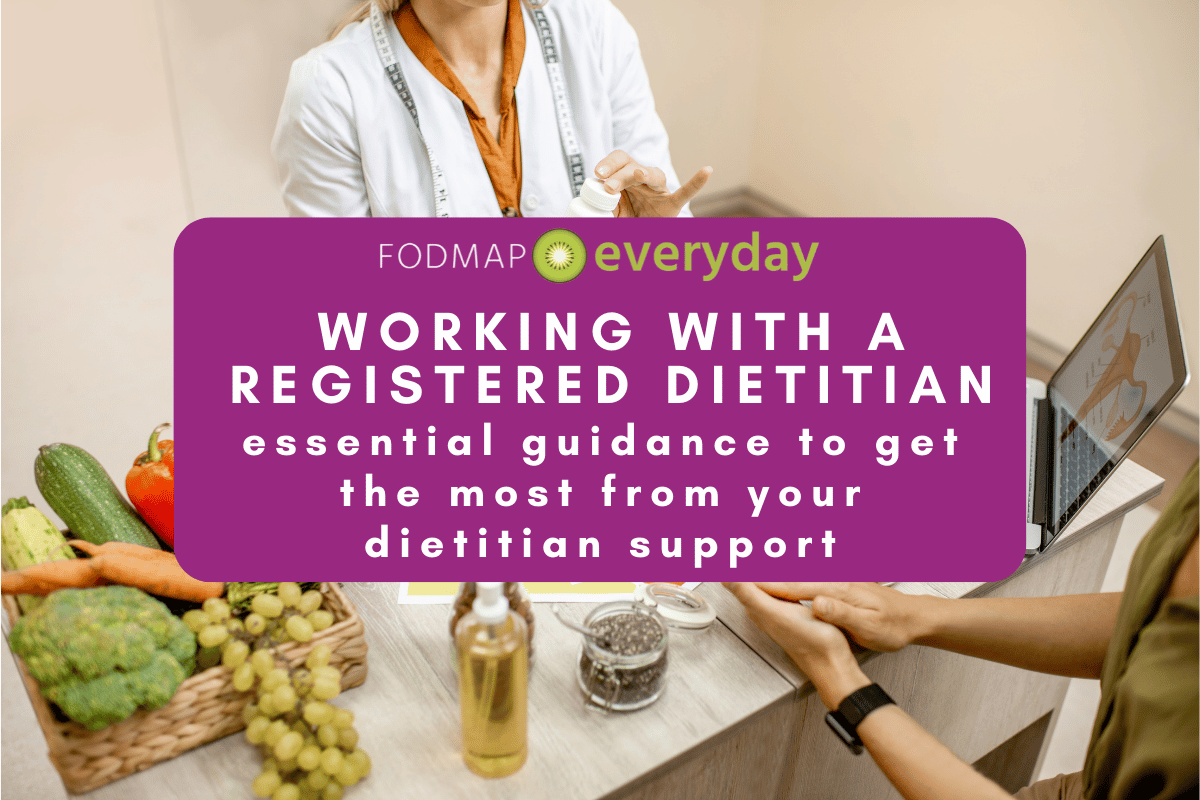
The Role Of The Dietitian
Here, in brief, is who a dietitian is, and what they do.
- Dietitians are highly educated health professionals and participate in continuing education.
- They are regulated/licensed and bound by strict laws, ethically and legally.
- RDs take a personalized approach to digestive health and are able to look at the big picture. For instance, if you also have GERD, are diabetic, have weight issues, are an endurance athlete, or are vegan, as examples, it is important to work with a dietitian – and about 36% of us with IBS have concurrent issues involving food and digestion.
- RDs utilize dietary guidelines (NICE [National Institute of Clinical Excellence], Nutrition Care Manual, ACG [American College Gastroenterology], etc.) to provide personalized dietary recommendations and dietary advice – e.g., first-line IBS guidelines to start (limit spicy foods/fat/alcohol, etc.), then moving into more detailed changes, such as low FODMAP (and its myriad versions, such as Gentle), as appropriate.
- Recommends appropriate lifestyle changes and guidance (exercise, stress management, regular meals, etc.) and IBS-related, evidence-based supplements when appropriate (ex. probiotics, fiber supplements, peppermint oil capsules, etc.)
- Typically spends 30-60+ minutes per client/patient per session, allowing for a more detailed investigation of the origins of symptoms.
- May suggest specific testing to patient and/or GI (but cannot prescribe or carry out) to help further home in on, or rule out, issues (many GI disorders are overlapping or look somewhat similar).
- If your insurance is going to cover any appointments, it would be with a RD, not a “health coach” or equivalent
- Dietitians will ensure that you do not suffer from malnutrition, which is a concern with any elimination type diet.
- A dietitian will ensure that you have a positive relationship with food. This is incredibly important and often overlooked. Folks undertaking the diet themselves can fall into the trap of becoming scared of eating or suspect of foods.
What Conditions Do Dietitians Help With?
Dietitians are trained to provide a wide range of dietetics support for a long list of conditions. From chronic disease support for diabetes, Crohn’s disease, inflammatory bowel disease (IBD) to nutritional support for functional gastrointestinal disorders such as IBS.
They also can provide support for weight management, nutritional support through cancer treatment, as well as food allergies. They work with children all the way to geriatric patients, in clinic settings or through video sessions.
A large percentage of people are dealing with concurrent medical issues along with their IBS. It could be IBS and GERD or IBS and celiac disease, or perhaps, your system has stumped you so far. Everyday we hear from folks who are having multiple issues from digestive along with skin reactions, vomiting, brain fog and more. The registered dietitian is the medical professional who can help manage your approach to diet across medical concerns.
A large percentage of people are dealing with concurrent medical issues along with their IBS…The registered dietitian is the medical professional who can help manage your approach to diet across medical concerns.
You can work with a dietitian for short-term management or long-term support.
How To Choose A Dietitian
You can read our in-depth article: How To Choose A Dietitian for our recommendations on this topic
Where to Find A Low FODMAP Diet Experienced Dietitian
If you’re looking for a RD who has experience with the low FODMAP diet, various credible websites have dietitian/provider directories including our own here at FODMAP Everyday®, and the Monash University website. You can also seek out dietitians who have undergone training courses with Monash University and Kings College.
We have a Global Dietitian Directory for you and, nowadays, it is easier than ever to find one to work with, because many will work with you remotely via a telehealth appointment. Do not limit yourself to thinking you have to work with a dietitian nearby.
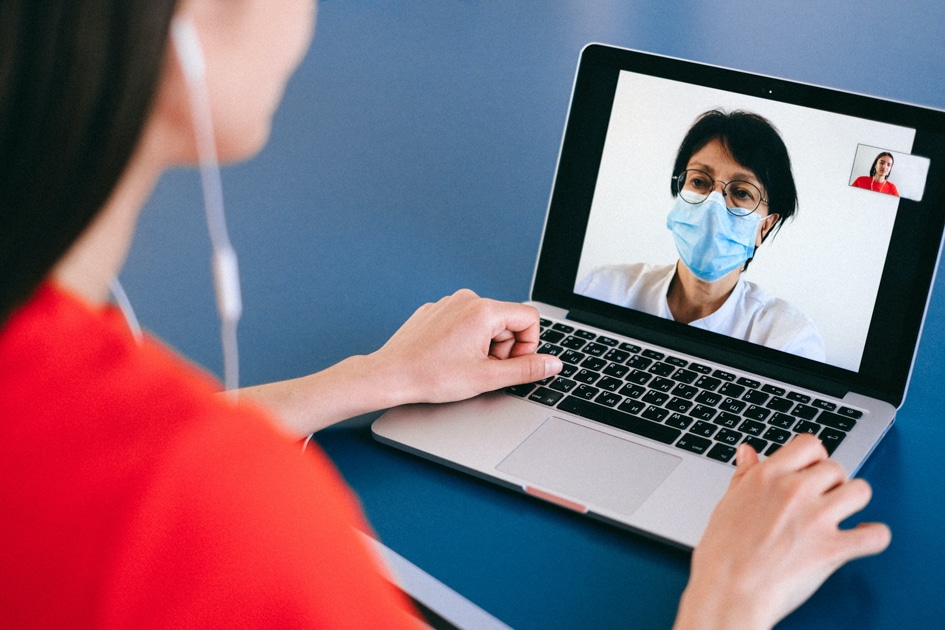
Read more here about meeting remotely in our article: Patient Dos and Don’ts For a Great Telehealth Appointment.
There are also some amazing offers out there. Joe Leech and his team from Diet vs. Disease offer a 30-minute consult for $29 and they have helped thousands of people around the globe.
Modify Health are the makers of prepared low FODMAP meals (they even have some of our very own recipes prepared for you!), but what a lot of folks don’t realize is that they also offer access to FODMAP trained dietitians at a nominal cost. Read more here.
Meeting With A Dietitian
What does this all mean to you, if you are told to follow the low FODMAP diet? What is it like to meet with a dietitian? In layperson’s terms, they take you by the hand, and make sure you are sound nutritionally, logistically and emotionally. The GI is not there for that. The RD talks to you, on a very personal level, to discover what your days and routine look like. The GI does not; but it also not their job. It IS the dietitian’s job. It is exactly what they are there for.
Here is what you can discuss with your dietitian – you can get into the nitty gritty of everyday life/food planning:
- If you enjoy granola, fruit and a cup of coffee every morning, can you still?
- Do you pack lunches? Can you still have sandwiches? How do you make a low FODMAP sandwich?
- You need to make dinner for a whole family, or maybe are shopping and cooking for one – dietitians can offer strategies for both.
- Are you a scratch cook, or do you rely on packaged food? RDs will make appropriate suggestions.
- Do you buy a lot of take-out food, or eat frequently at restaurants? How do you stay FODMAP compliant?
- Maybe you dislike olives and walnuts. Or you eat meat, but it has to be thoroughly cooked. You need help with recipes and meal planning taking all of this into account.
- What does your pantry look like? Do you know what is low FODMAP and what is not?
- Dietitians can offer recommendations for low FODMAP brands and products.
- If you eat something and fart, does that mean the food is not okay for you?
- Your child has an ice cream social event coming up at school. Can you participate and have a scoop?
- How long should you stay on the Elimination Phase? How do you know when to progress to the Challenge Phase?
- When you are in the Challenge Phase, do you consider a challenge “failed” if you have very mild symptoms?
I could go on and on. The point is, that the GI is not going to be involved with you to this extent. The dietitian is going to guide you the whole way through – and make sure that you have a great relationship with food in the end.
The dietitian is going to guide you the whole way through – and make sure that you have a great relationship with food in the end.
What If I Can’t Afford A Dietitian?
We often hear people say they cannot afford a dietitian. You are in charge of your finances, of course. We are here to point out a few things for you to think about:
- The low FODMAP diet is nuanced and complex; the great majority of people do need help with the low FODMAP diet in order to succeed.
- Statistically, and anecdotally, you have a greater chance of successfully decreasing IBS symptoms with the low FODMAP diet if you work with a dietitian.
- Working with a RD means you will be pain-free and symptom-free more quickly.
- You may gain your quality of life more readily.
- You will save time and money if you work with a RD. Read that sentence again; it is true.
- If you do not work with a RD there are chances of developing disordered eating patterns, which can have lifelong effects.
- Working with a RD is often an out-of-pocket expense, but it is also not necessarily a very long term, pricey endeavor. Please read our article, Have IBS? Top Reasons To Work With A Dietitian.
- And speaking of budget, please read our article, How To Follow The Low FODMAP Diet On A Budget.

The Takeaway
Gastroenterologists (GI) and dietitians (RDs) are an integral part of your medical team if you have digestive issues. They work together to help you improve your gut health.
Get a diagnosis from a GI. The low FODMAP diet is diagnosed through exclusion. There is no one test for IBS. The GI should screen you for celiac, inflammatory bowel disease, crohn’s disease, and possibly other medical issues whose symptoms can mimic IBS, such as endometriosis and diverticulitis, to name a few. Do not self-diagnose or put yourself on the low FODMAP diet.
If your GI recommends the low FODMAP diet, find a RD to work with. We believe they are a necessary part of your success. We define success as becoming symptom-free and having a great relationship with food.
You are statistically and anecdotally more likely to succeed on the low FODMAP diet if you work with the expertise of a RD. You will achieve a reduction or elimination of symptoms much more quickly if you work with a RD.
You are statistically and anecdotally more likely to succeed on the low FODMAP diet if you work with a RD. Working with a RD ultimately saves you time and money.
Working with a RD ultimately saves you time and money. You will not waste money on foods you shouldn’t eat, diets that don’t work, or supplements that are inappropriate. If a food that you eat doesn’t agree with your GI tract – even if it is low FODMAP – the RD will strategize the next steps.
With a GI and RD as part of your medical team, and evidence-based resources like FODMAP Everyday®, you can get better!
Be sure to read all of our Low FODMAP Basics articles! Click the photo below.
